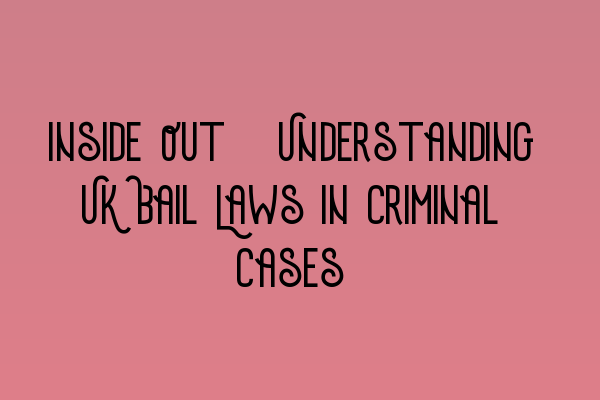Inside Out: Understanding UK Bail Laws in Criminal Cases
Introduction:
When it comes to criminal cases in the UK, one concept that often becomes a key focal point is that of bail. Bail can have a significant impact on the overall outcome of a case, affecting the lives of accused individuals and their families. In this blog post, we will delve deep into the intricacies of UK bail laws, highlighting the key features, procedures, and implications. By gaining an understanding of bail laws, you can better navigate the legal system and protect your rights.
1. What is Bail?
Bail, in the context of criminal law, refers to the temporary release of an accused person before their trial or legal proceedings. It allows the individual to remain in the community rather than being held in custody while awaiting their day in court. However, it is essential to note that being granted bail does not indicate innocence, as the presumption of innocence always remains until proven guilty.
2. Types of Bail:
The UK legal system provides several types of bail, tailored to different circumstances. These include:
– Police Bail: When a person is arrested, the police have the power to release them on bail until their scheduled court appearance. This often comes with conditions, such as reporting to the police station regularly or refraining from certain activities.
– Court Bail: If an accused person has been remanded in custody until their trial, they can apply to the court for bail. The court will assess various factors, including the seriousness of the alleged offense, the potential flight risk, and the accused person’s ties to the community, before making a decision.
– Conditional Bail: Conditional bail involves the imposition of specific conditions that an accused person must adhere to while released. These conditions can include surrendering travel documents, staying away from certain individuals, or attending regular check-ins with authorities.
– Unconditional Bail: This type of bail is less common and is granted when the court believes there is minimal risk of the accused person not attending their trial or engaging in criminal activities while on bail. It typically comes without any conditions.
3. The Bail Hearing Process:
When applying for bail, it is vital to understand the bail hearing process. Typically, the process involves the following steps:
– Application: The accused person or their legal representative applies for bail, either at the police station or in court, depending on the circumstances.
– Bail Determination: The court will assess the application, considering factors such as the nature of the alleged offense, the strength of the evidence, the accused person’s criminal record, and their ties to the community. The court will then make a decision based on these considerations.
– Bail Conditions: If bail is granted, the court may impose specific conditions that the accused person must fulfil until the trial. Failure to adhere to these conditions can result in the revocation of bail and the return to custody.
4. The Role of the Bail Act 1976:
The Bail Act 1976 serves as the foundation for bail laws in the UK. This legislation sets out the legal framework for granting or denying bail, along with the criteria that must be considered by the court. The act aims to strike a balance between protecting the public and ensuring the rights and freedoms of the accused individuals.
5. Recent Bail Law Reforms:
In recent years, the UK government has introduced several reforms aimed at streamlining the bail process and reducing the number of individuals held in custody. These reforms emphasize the presumption of innocence and seek to address issues of overcrowding in prisons. It is crucial to stay updated on these changes to ensure your rights are protected.
Conclusion:
Understanding UK bail laws is paramount when navigating the criminal justice system. By comprehending the different types of bail, the bail hearing process, and the role of legislation, you can actively participate in your defense and secure the best outcome for your case. Remember, seeking the advice of a qualified solicitor experienced in criminal law is always advisable to ensure you receive the most accurate and relevant information for your situation.
If you require further assistance or have any specific questions regarding bail laws in the UK, do not hesitate to reach out to our team at SQE Criminal Law & Practice Law UK. We are here to provide you with expert guidance and support throughout your legal journey.
